- Home
- Patricia McLinn
Warm Front Page 20
Warm Front Read online
Page 20
Quince went on with a rough outline of how it might work, filling them in on the research he’d done, the resources he’d found. He also brought up the timeline, which pretty much defined the term delayed gratification.
“If we can’t farm our land, we’re going to need something to live off of, not to mention these people handling the details wouldn’t work for nothing,” Kevin Benzil said.
“You’re right. You’d need bridge financing for—”
“Oh, right, like Bob Chitmell’s going to fork over—”
“Not Chitmell.” Again, Quince had been more forceful than he intended. “It would be wiser to look for financing from an entity without potentially conflicting priorities.”
“Like one not in bed with a developer,” someone muttered, low enough that Quince didn’t recognize the speaker.
Figured that these folks were already aware of that. His research had given Quince good reason to think the banker was in cahoots with a developer with a reputation for pushing the limits of shady. Good reason, but not enough proof. Not yet, anyway.
“I have leads on potential financing in state, but not right here in the county, that I’d be happy to turn over to you once you’ve organized — if you decide to go this route.”
“Would you be part of that organization?” Ned Junior asked.
“Don’t worry, I’m not setting myself up to be part of what’s your—”
“Could you be part of it?” he amended. “At least as a consultant.”
Quince couldn’t stop himself from looking at Anne. She still had her head down.
“There would be a lot of decisions to make before that possibility would come up. An impartial expert might be concerned about possible conflicts of interest because of my Zeke-Tech role.”
“A lot of decisions to be made….” Ned shook his head.
“Where would we even start?” added his younger son.
It was the opening Quince needed, but not from the person he’d wanted.
He shot another look at Anne, with no response.
Consciously shifting to business mode, he began to lay out the possible paths.
*
Outside the church, with people still milling around, she watched Ned clap Quince’s arm. “Noticed you didn’t say absolutely no to my boy’s proposal about being a consultant.”
“Ned—”
“I know, I know. Down the road.”
The Benzils left, apparently in relatively good humor.
Anne said to Everett, “I’m getting a ride with the Larkins.”
Quince reached for her. “Anne—”
She jerked her arm away.
“You said you always wanted to grow things,” he said. “This way you still can. And you can do it the way you want to. You’ll have the resources from your share of Hooper Farm to give you a cushion, a stake. Instead of always scrambling.”
“Don’t. Just don’t.”
“You’re not going to stop this.”
“This what? Progress? You’re going to tell us we can’t stand in the way of progress? Well, progress can’t run us over, either. It can’t push us out of our homes.”
“You can stay in the house, all of you can stay in your houses, once you sell off the land, or—”
“With all those people around us?” Everett started. “Wh—”
“Or,” Quince interrupted firmly, “you can sell the house and land to buy somewhere else. Or you can continue going the way you’re going until you’re bankrupt and get a lot less for the land or house. You have choices. They don’t include the one you want. But if you’re not brave enough to make the choice, it will be made for you.”
“I won’t. I won’t give it up — I won’t give up.”
“Anne, I want to help. I’m trying to help. It’s what I do at Zeke-Tech and I’m good at it, if you’ll—”
“He is,” Zeke said.
“I’m — the farm isn’t a problem to solve then move on from.”
“Well, once a problem’s solved, why would he—”
“Shut up, Zeke,” Quince snapped.
“No, he’s right. And he’s telling the truth. I appreciate that. Thank you, Zeke.”
“You’re welcome.” The owner of Zeke-Tech sounded confused.
“C’mon, Zeke, let’s go,” Darcie said.
Everyone was melting away, leaving her and Quince facing each other in the cold dimness.
“It’s what you don’t understand, Quince. A farm is a never-ending series of problems to solve, to resolve, to improve, to reconcile yourself to not solving. You can’t do that. That’s not who you are. I see that after this meeting. You need to solve it. I understand after— I understand. I do. But this isn’t going to work. Us. It was a bad idea. A very bad idea.”
“Anne—”
As she backed away her fingers trailed across his cheek as if reluctant to leave his skin. “Thank you for trying, but no. I can’t let the farm go. I can’t do that to him.”
“To Everett? But—”
“Chris.
She was calm. Too calm.
“It’s the one thing I can do for him now. Save the farm. I couldn’t save him. He was gone when I found him. Hanging from the hayloft pulley. I got him into the hayloft, but I couldn’t get him free. I couldn’t…” She sucked in a breath. “I broke the pulley. That’s why it doesn’t work. I broke it.”
*
Suicide.
Quince fought to keep his breathing even.
Her husband had committed suicide and no one had ever told him.
What the—
Later. Deal with that later.
Right now there was Anne. Those bruised eyes, and the blow she’d sustained.
“Was there a note?”
“Yes.”
If Chris Hooper had blamed her…
Well, the man was already dead, so he couldn’t kill him. Besides, what mattered was Anne.
She was too contained. Too withdrawn.
Even if the answer was the worst possible one, she needed to let it out.
“What did it say?” He didn’t let himself touch her. Just waited.
Tight, raw, determined, her voice came slowly. “He was sorry to let us down — Everett and me. He loved us. He couldn’t take the failure anymore. We’d all be better off without him, including the farm.”
No recriminations against his wife. Quince breathed out, then in. “That was all?”
“Wasn’t that enough? I’d made him feel like a failure. I’d made him feel like he couldn’t make a success of the farm.”
“You can’t blame yourself for how he felt. He was a farmer. He formed his own conclusions.”
She pushed her hair behind her ears, then kept the movement going to meet at the back of her neck, as if to rub a knot there. “I wasn’t paying close enough attention. Like you said about the suicide rate among farmers, he wasn’t getting help. He was putting it all on himself. And I was so caught up in the farm and my fantasy of living on a farm…”
“So now you’re doing the same thing, putting it all on yourself? That’s wrong, Anne. Besides, every word I’ve heard is how good you were for him. How much better he was with you. How he adored you.”
“If he hadn’t adored me would he still be alive? Because he adored me he couldn’t stand living with what was happening. Loving me made it harder for him to face — impossible for him to face. That’s what loving me did to Chris Hooper.”
“Anne, you aren’t the reason he killed himself.”
“How could you know? How could you possibly know?”
She came toward him and for an instant he thought it would be okay. Because her expression was so soft. Softer than he’d ever seen it. Even after they’d made love. It was … yes, almost yearning.
Then she reached up one hand to his cheek and kissed him on the other one, and his heart dropped to the bottom of his gut like a rock.
“Anne—”
“I can’t ask you to move out—” The sound wa
sn’t a laugh. It had far too many edges. “We need your money too much. But a few days. I need a few days with you not there. Not at Hooper Farm. I need that.”
*
He stood alone until the departing trucks left no echo.
Then Darcie and Zeke reappeared as quietly as they had disappeared.
“I didn’t mean to say the wrong thing,” Zeke said. “Maybe if I went after her and told her—”
“No,” Darcie said in unison with Quince.
“No,” Quince repeated. “There’s a time to admit defeat.”
Zeke looked at him with such disbelief he almost thought he could laugh. Almost.
To Zeke there was no such thing as defeat. There was simply working harder, smarter, longer until you defeated the problem.
But Zeke didn’t work with people.
“I, uh, better go now.” Quince said.
“Where?”
As usual, Zeke had zeroed in on the core issue.
Where the hell did he go now? If his being there hurt Anne so much—
“You’re staying with us,” Darcie said.
Oh. Right. They were talking about where he’d sleep — at least lie down — tonight.
“I can’t intrude—”
“You’re not intruding. You’re staying. That’s final.”
“It’s not neces—”
“Don’t make Darcie arrest you,” Zeke said. “She says it’s final, so it’s final.”
*
“Here’s your tea, dear. Much better for an afternoon break than coffee. Come join me,” Mrs. R patted the kitchen table at Hooper Farm in invitation. Or was that an order.
Everett had been in bed yesterday and today with a bad cold, or possibly the flu that had been making the rounds of the poker group.
Mrs. Richards had gotten a ride out to visit him.
Then he fell asleep.
Well, sleep was the best thing for him.
But Everett sleeping was not that good for Anne, because Mrs. R settled in at the table in a way that made it clear she expected to have a nice, cozy chat.
Suppressing a sigh, Anne closed the computer tax program and joined her at the table.
Mrs. R nudged a mug toward her. “You know I’m a widow, too.”
She blinked. “I, uh… Yes, I did know that.”
The older woman nodded. “Trouble with that term is it’s all about what you aren’t. You aren’t married anymore. You aren’t sharing your bed and your life with the man you chose to pledge yourself to. You aren’t single exactly but you’re single enough to not fit in with married couples, either.”
“I suppose so.” Where on earth had this conversation come from?
“You know what Vanessa gave me for Christmas?”
And now they were off in another direction — equally unfathomable.
“No, I don’t.”
“My own computer. I told her it was too much, told her I like going to the computer lab, because I get to see my friends in Drago along with those online folks. But she wasn’t taking no for an answer. And Josh weighed in, saying when the weather’s bad, we couldn’t have Vanessa fretting about me getting back and forth to the computer lab on foot, especially if it was when she had to be in Virginia or somewhere else for work. As it is, she’s checking up on me two, three times a day. So I had to agree that Josh had a point. So I’ve been using that little computer and I’ve discovered something.”
Still lost, Anne dutifully asked, “What did you discover?”
“That other people have been feeling some of the same things I’ve been feeling. All this time I thought I was alone. But typing on that thing at home, with nobody around me who might just be trying to look over my shoulder has opened me up. Saying things I’d only thought until now. You know, what I mean?”
No.
She was trying to come up with a way to convey that without being rude when the older woman continued.
“And what some of us have been talking about is being a widow. Or a widower. They got their problems, too.”
Ah. The winding path of the woman’s words had come back around to where she’d started. Though that didn’t help all that much.
“We’ve been talking about how at the start of being a widow — or a widower — all you see are the things you aren’t. And how it takes a while to see that there are other things that you still are. You’re still a woman, for one — or a man, if you’re a widower. And you’re still a person. You still have a heart and a body and a soul and a brain. And you’ve got to keep using those things. Some say that’s because that’s what their dead spouse would want. They’d want them happy.
“Well, I wasn’t so sure about my Ron. I don’t think he would, not if he were honest. On the other hand, maybe being dead’s made him less self-centered, because it would make sense if the afterlife improves a person’s character, don’t you think?”
“Um. I can see the logic, I guess.”
Mrs. Richards said emphatically. “Me, too. So I believe my Ron does want me to be happy. He might even be sad that I’ve waited so long to get back to focusing on what I am instead of what I’m not.” She considered that a moment, then added with decision, “And if he doesn’t want me to be happy, shame on him, because I was always a good wife to him and he should appreciate that enough to want me to be happy.”
The best Anne could produce was a nod.
“But there’s no question with your Chris. He was a fine man. Oh, I know he had his problems, poor soul. But how he looked at you… And you brought out the best in him. Got him involved, part of the community again. Then when he died you drew in worse than he ever did. Nobody’s saying how long you should grieve, but here’s something I’ve learned — being alone and sad doesn’t help the grief any, being with other people and having a good time doesn’t make it go away, either. It’s going to be there no matter what you do. Going to be there and be there and be there, until you notice one day that it’s not as bad as it was. And then a while longer you realize it’s gotten better than not-quite-as-bad-as. And it goes on like that. Never away completely, but sort of worked in to how you’re living, including being happy.”
Quince had grieved. Grieved so strong for Fiona.
But he hadn’t died from it. He’d gone on.
“You understand what I’m saying?”
“I… I think I do.”
And maybe he’d also taught her baby steps in going on. The problem was she was so far behind him on that path. So very far.
“Good. So you might as well try your best to be with other people and have a good time, especially if there’s one special person.” Mrs. Richards took her hand between both of hers. “I made a mistake I don’t want you making. I stopped living. Did that for far, far too long. Didn’t help a thing. It just hurt. And I don’t want you doing that. So, you talk to that boy.”
*
Anne thought Everett was asleep, but when she put down a pitcher of water and fresh glass on the bedside table, his eyes opened.
“Been thinking.” His voice was crackly and thin. “Maybe it’s time.”
“Time?”
“Give up this old farm. Try something new.”
“Everett—”
“What’s the point of staying on if it’s just because we’ve always been here? Farmin’s farmin’. Doesn’t have to be this same piece of land. Was always happy enough to farm the extra rented acres. Besides, you’re a young woman. You should—”
“No.” She swallowed against the swell in her throat. “No. it’s not time for that.”
CHAPTER TWENTY-FIVE
Everett looked better the next morning and loudly insisted he was. They were low on fresh produce and she was overdue for a stop at the dealership, so Anne headed to town.
She caught herself looking for Quince or his car as she passed the café, the computer lab, the Zeke-Tech temporary offices.
She told herself to knock it off.
She’d gone off the rails, but she’d get back on them
now. Doing what she’d been doing these past years, fighting tooth and nail for Hooper Farm.
The first small step was seeing to her duties at the dealership. In and out. Clean and simple.
Jennifer had other ideas.
She relinquished the computer and chair to Anne as always, but then she went to the door, closed it, and returned to take a chair on the other side of the desk.
“I have something to say. I know about wanting to do things yourself. I know about the importance of it. The…” Jennifer’s gaze drilled into Anne. “The apparent necessity of it.”
She leaned forward, propping her arms on the desk, pointing her clasped hands at Anne. “But it’s just as important, it’s just as much of a necessity to learn how to work with people. Sometimes to accept help from people. From friends.”
Jennifer’s intensity wouldn’t let her look away.
“I appreciate what you’ve done for me by giving me this job, and—”
“Don’t confuse things, Anne. The job is a job. And you earn your pay and probably more with the work you do. That’s not what we’re talking about.”
“Okay.” She released a breath. “Okay. You mean the farm. I know that. It’s just—”
“Right. The farm, and all that Quince has tried to do for you, and now this opportunity.”
“Opportunity? Opportunity to give up. Whatever his intentions, this is wrong. Wrong, wrong, wrong. I will not be the person responsible for the farm going out of the Hooper family. I will not be. I can’t—” She stopped, because the next sound out of her throat would not have been anything as controlled as a word.
“You aren’t.”
“Of course I—”
“No, you’re not. Everett’s name is on the deed, and it’s his decision. And it should be, because he ran that farm for how many decades? Maybe nobody could have avoided the financial trouble Hooper Farm is in now, with prices and weather and the pressure from the town growing. But Everett made his share of mistakes. And so did Chris. And one of the biggest for both of them was being too damned stubborn to accept help.”
“That’s not—”
“Oh, yes it is. You don’t believe me? You ask other farmers around. Will Larkin had his truck in for repairs and I heard him telling about the year Everett reinjured his leg the last time and Chris was out every night, all night trying to get the harvest in. And when people came round offering to help he told them no — and not all that politely — because he hadn’t helped them in the past year and he wasn’t going to take charity. Let me tell you, that put backs up. Because it said anybody who’d accepted help in the past was taking charity, and you know people around here don’t like that at all.

_preview.jpg) Almost a Bride (Wyoming Wildflowers Book 1)
Almost a Bride (Wyoming Wildflowers Book 1)_preview.jpg) Prelude to a Wedding (The Wedding Series Book 1)
Prelude to a Wedding (The Wedding Series Book 1)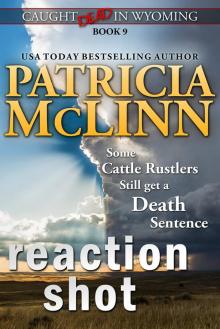 Reaction Shot (Caught Dead in Wyoming, Book 9)
Reaction Shot (Caught Dead in Wyoming, Book 9)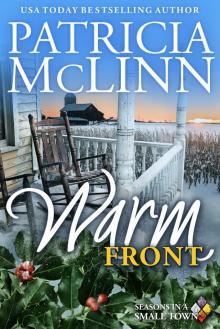 Warm Front
Warm Front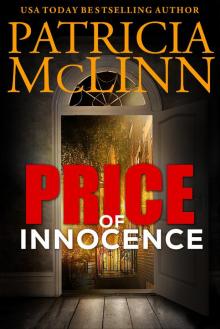 Price of Innocence
Price of Innocence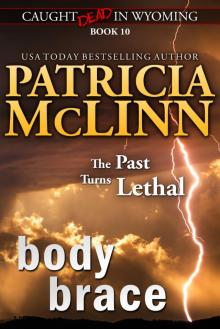 Body Brace (Caught Dead in Wyoming, Book 10)
Body Brace (Caught Dead in Wyoming, Book 10)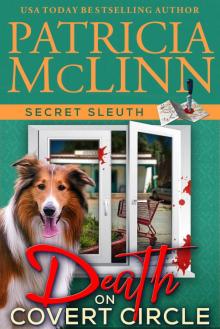 Death on Covert Circle
Death on Covert Circle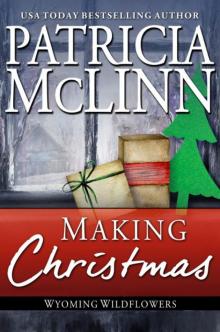 Making Christmas
Making Christmas Death on Torrid Ave.
Death on Torrid Ave.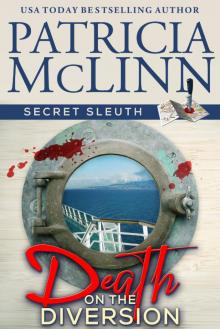 Death on the Diversion
Death on the Diversion The Rancher Meets His Match
The Rancher Meets His Match Widow Woman
Widow Woman The Runaway Bride
The Runaway Bride Hoops
Hoops A Stranger in the Family (Book 1, Bardville, Wyoming Trilogy)
A Stranger in the Family (Book 1, Bardville, Wyoming Trilogy)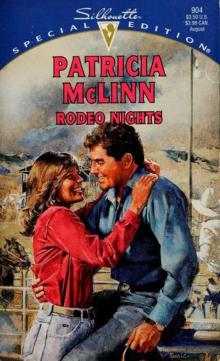 Rodeo Nights
Rodeo Nights Wedding Series Boxed Set (3 Books in 1) (The Wedding Series)
Wedding Series Boxed Set (3 Books in 1) (The Wedding Series)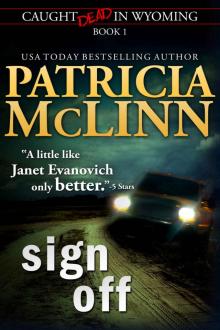 Sign Off (Caught Dead in Wyoming, Book 1)
Sign Off (Caught Dead in Wyoming, Book 1)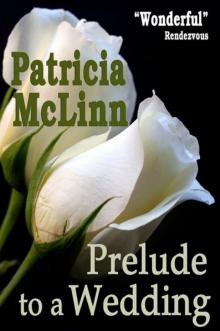 Prelude to a Wedding
Prelude to a Wedding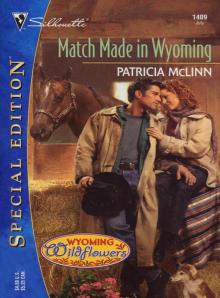 MATCH MADE IN WYOMING
MATCH MADE IN WYOMING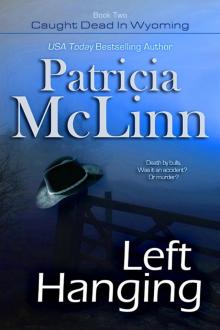 Left Hanging
Left Hanging What Are Friends For?
What Are Friends For?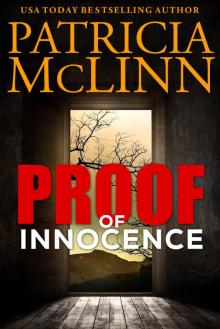 Proof of Innocence
Proof of Innocence Hidden in a Heartbeat (A Place Called Home, Book 3)
Hidden in a Heartbeat (A Place Called Home, Book 3)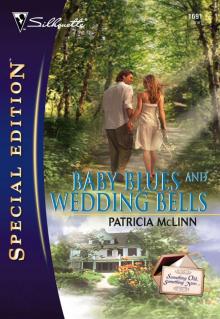 Baby Blues and Wedding Bells
Baby Blues and Wedding Bells Least Likely Wedding?
Least Likely Wedding? Heart Stealers
Heart Stealers Grady's Wedding
Grady's Wedding Right Brother
Right Brother Wedding of the Century
Wedding of the Century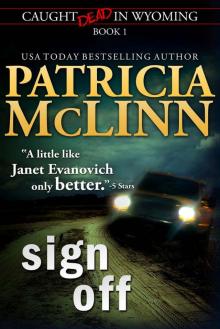 Sign Off
Sign Off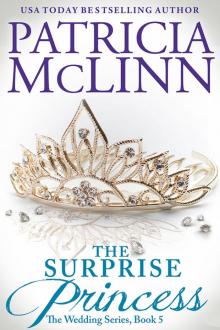 The Surprise Princess
The Surprise Princess Wyoming Wildflowers: The Beginning
Wyoming Wildflowers: The Beginning